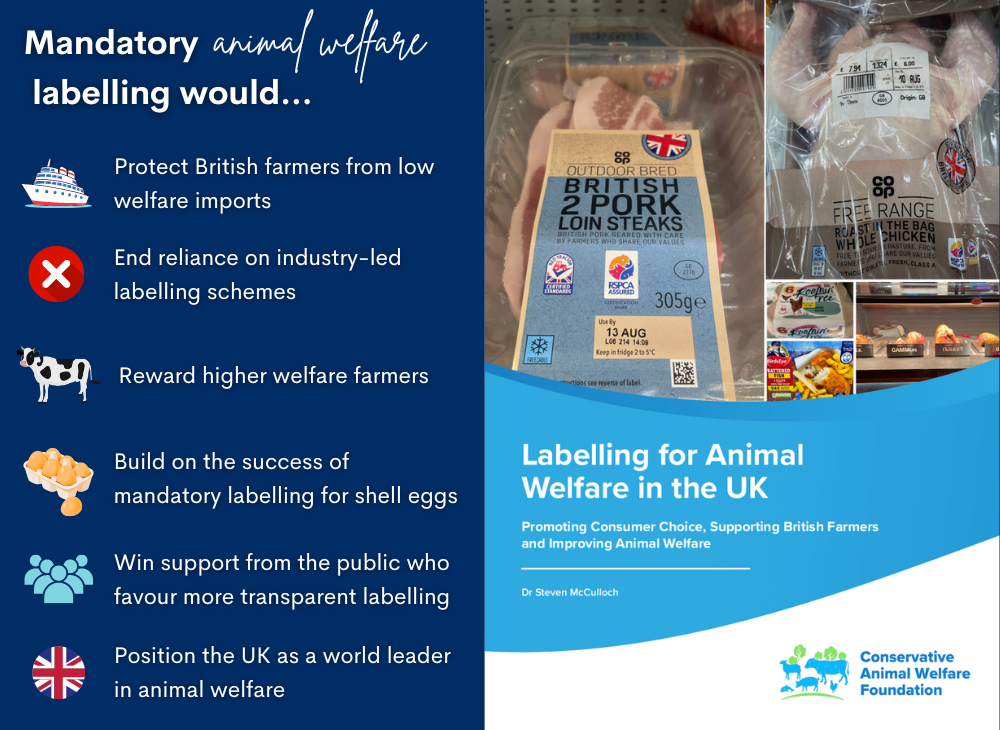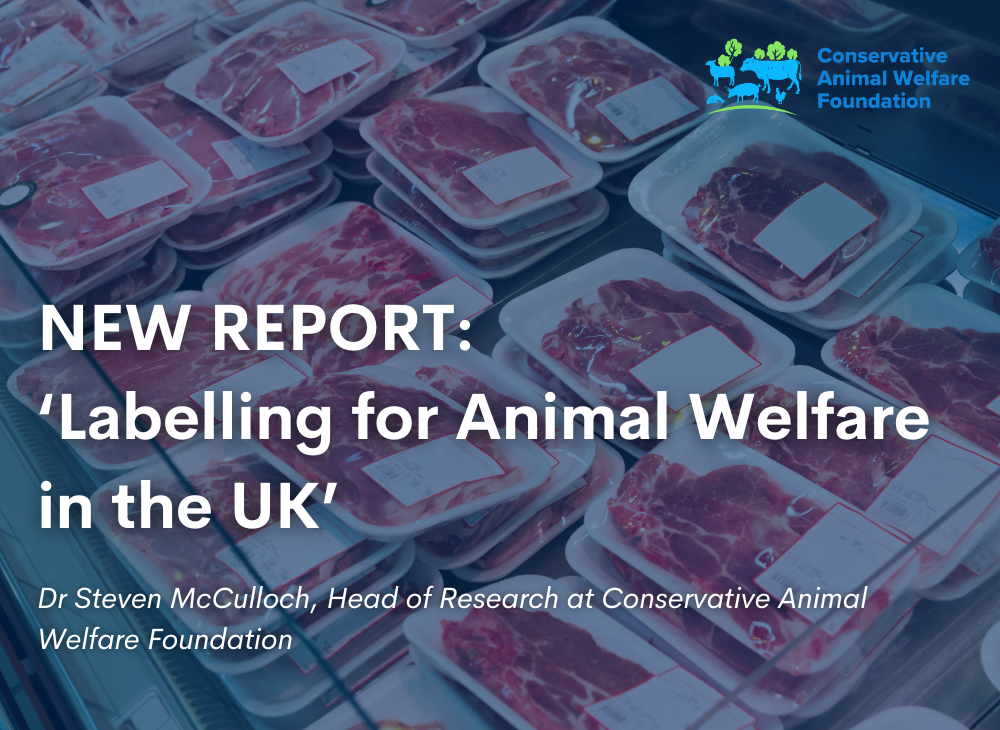London, 6th February 2024
Today (Tuesday 6th February) Conservative Animal Welfare Foundation (CAWF) has published a new report, ‘Labelling for Animal Welfare in the UK’ which makes the case for mandatory animal welfare labelling to be implemented in the UK.
The report is authored by CAWF Head of Research Dr Steven McCulloch, qualified veterinary surgeon and Senior Lecturer in Human-Animal Studies at the Centre for Animal Welfare, University of Winchester.
Conservative Animal Welfare Foundation has long called for mandatory labelling for animal welfare to provide such information at the point of purchase; in particular, labelling based on method of production and method of slaughter.
Today’s report reviews the animal welfare labelling landscape in the UK and the EU and examines various schemes in existence such as Lidl’s “Welfare Windows”, and the French Étiquette Bien-Être Animal. It shines a spotlight on several key reasons why animal welfare should be included in any future Government-mandated labelling system:
- Low welfare imports: Since the UK generally has higher farm animal welfare standards compared to potential trade partners, there is a need to label imported meat, dairy and eggs produced to lower standards than our own following the UK’s exit from the EU. This would protect British farmers from being undercut by low welfare imports.
- The problem with UK industry-led labelling schemes: Animal welfare labelling in the UK is dominated by national industry-led schemes, funded by the farming industry and championing the producers they represent. The standards of such schemes are often at or barely above the legislative baseline, and their marketing claims of high welfare produce can be confusing for British consumers. National industry-led schemes cannot, therefore, be a substitute for an effective Government-regulated mandatory labelling system.
- Public opinion: The British public strongly favours animal welfare labelling; for example, a 2021 poll found 68% of respondents agreed animal products should be labelled to show the conditions that animals had been reared in. A Eurobarometer poll found that 72% of UK citizens were also willing to pay (WTP) more for products sourced from animal welfare-friendly systems.
- Rewards for higher welfare farmers: Labelling will reward farmers who produce to higher animal welfare standards. Currently, British farmers who wish to rear their animals in higher welfare standards are disincentivised by the confusing labelling landscape in the UK.
- Models for success: In the UK, the production of cage-free eggs nearly doubled over a decade, from 31.6% of the market in 2003 (just before labelling was introduced) to 55.7% in 2013 (a decade after labelling was introduced). This model demonstrates the potential for method of production labelling to drive improvements in farm animal welfare when consumers are empowered to make informed purchasing choices.

Ultimately, the report recommends the implementation of a method of production labelling system. Method of production, such as “indoor”, “free range”, and “organic”, is the key determinant of the welfare of farm animals. Furthermore, citizens and consumers associate method of production with farm animal welfare. Method of production also provides governments with a practical policy solution for labelling schemes. For these reasons, Germany has a mandatory method of production scheme, which it will apply to pigs, before expanding to other sectors.
This report also praises NGO-led certification schemes such as RSPCA Assured and Soil Association Organic, and recommends that membership of such schemes could be a requirement for higher tiers within a future Government-regulated mandatory labelling scheme.
Today’s publication follows the Defra Call for Evidence on mandatory animal welfare labelling in 2021, and the subsequent decision to drop pledges to hold a Consultation in 2023. In January 2024 Defra Secretary of State Steve Barclay MP said the Government would instead hold a Consultation on country-of-origin labelling.
You can read the full report here, and more about Conservative Animal Welfare Foundation’s campaign for mandatory animal welfare labelling here.
Lorraine Platt, Co-Founder of Conservative Animal Welfare Foundation, commented: “We believe that knowledge is a critical tool for consumers as they make decisions about which products they purchase. Today’s report underscores just how critical it is that the anticipated upcoming Defra Consultation incorporates animal welfare as a key component of any effective labelling system.
“Where labelling does currently exist, consumers have been able to identify higher welfare products and subsequently many farmers have been rewarded with increased demand. It is our hope that through extending labelling to all farmed produce, we can help the growth of higher welfare farms in the UK.”
Sir Roger Gale MP, Patron of Conservative Animal Welfare Foundation, commented: “It is high time that we realised the “Brexit Benefit” and made sure that our farmers are not disadvantaged by overseas producers generating cheaper product under conditions that would not be tolerated in the UK. I hope this report by Conservative Animal Welfare Foundation will show Government just what is possible with comprehensive, transparent and informative labelling.”
Dr Steven McCulloch, Head of Research at Conservative Animal Welfare Foundation, commented: “Method of production labelling, such as “indoor”, “free range”, and “organic”, refers to the environment farmed animals are reared in and is the key determinant of their welfare state. The lesson from eggs is that mandatory method of production labelling works; in the UK non-caged egg sales almost doubled over a decade, from around 30% of the market in 2003 to nearly 60% in 2013.”
“Germany has passed legislation for mandatory method of production labelling, to be applied to pig farming and to be expanded to other sectors. For Britain to continue as a global leader in animal welfare, it must follow Germany and legislate for animal welfare labelling. Method of production labelling promotes consumer choice, supports British farmers producing to higher welfare standards, and can improve the welfare of billions of sentient farmed animals in the UK and abroad.”
About Conservative Animal Welfare Foundation (CAWF)
The Conservative Animal Welfare Foundation was established in 2016 to raise awareness on the lives of billions of animals reared on intensive farms around the world and how this impact upon animal welfare, the environment and people’s health. We want to highlight the action people can take to help advance farm animal welfare.
Animal welfare is an increasing concern amongst the public, who frequently look to Government to take the lead in both maintaining and improving standards.
The Conservative Animal Welfare Foundation believes it is highly important that the welfare of farm animals is placed at the forefront of the Governments plan for food and farming along with its focus on productivity, competitiveness, and technology.
Media contact: Sophia Stileman (sophia.stileman@conservativeanimalwelfarefoundation.org)


